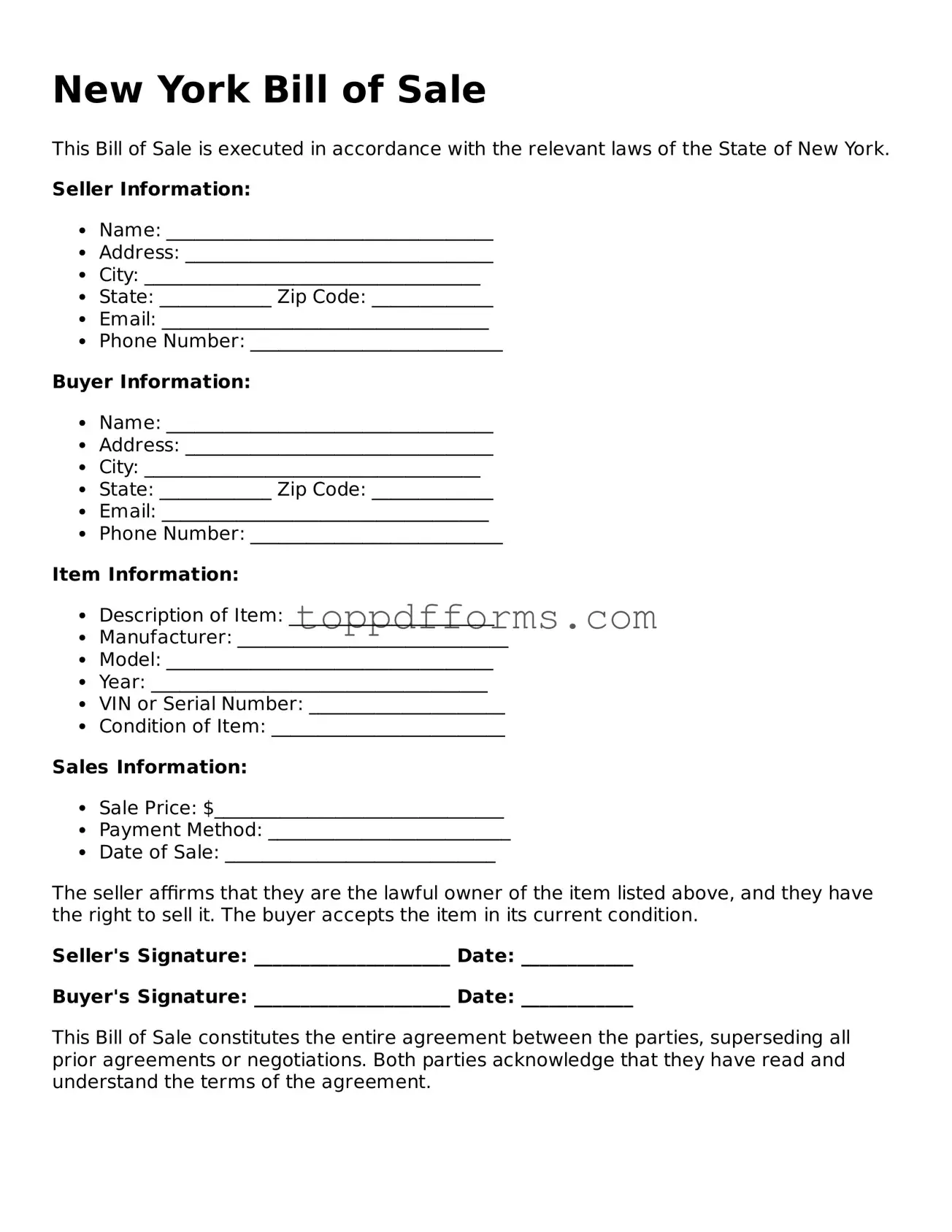Bill of Sale Document for New York State
Things You Should Know About This Form
What is a New York Bill of Sale?
A New York Bill of Sale is a legal document that records the transfer of ownership of personal property from one party to another. It serves as proof of the transaction and can be used for various types of property, including vehicles, boats, and equipment. This document outlines the details of the sale, including the names of the buyer and seller, a description of the item, and the sale price.
Is a Bill of Sale required in New York?
While a Bill of Sale is not legally required for every transaction in New York, it is highly recommended. For certain items, such as vehicles, a Bill of Sale is necessary for registration and titling purposes. Having a Bill of Sale can protect both the buyer and seller by providing clear evidence of the transaction, which can be important in case of disputes.
What information should be included in a New York Bill of Sale?
A comprehensive New York Bill of Sale should include several key pieces of information: the names and addresses of both the buyer and seller, a detailed description of the item being sold (including make, model, and VIN for vehicles), the sale price, and the date of the transaction. It may also be beneficial to include any warranties or conditions of the sale to avoid misunderstandings.
Do I need to notarize a Bill of Sale in New York?
Notarization is not typically required for a Bill of Sale in New York. However, having the document notarized can add an extra layer of authenticity and may be beneficial if the transaction involves significant value or if there is a possibility of future disputes. Always check specific requirements based on the type of property being sold.
Can I create my own Bill of Sale in New York?
Yes, you can create your own Bill of Sale in New York. There are no specific state forms mandated for this document, allowing flexibility in its creation. However, it is crucial to ensure that all necessary information is included and that the document is clear and unambiguous. Templates are available online, which can serve as a helpful starting point.
PDF Overview
| Fact Name | Description |
|---|---|
| Purpose | The New York Bill of Sale serves as a legal document that records the transfer of ownership of personal property from one individual to another. |
| Governing Law | This form is governed by New York State laws, specifically under the Uniform Commercial Code (UCC) and relevant state statutes. |
| Required Information | Essential details include the names and addresses of both the buyer and seller, a description of the item being sold, and the sale price. |
| Signatures | Both parties must sign the Bill of Sale to validate the transaction, ensuring mutual agreement on the sale. |
| Notarization | While notarization is not required, having the document notarized can provide additional legal protection and verification of the transaction. |
Common mistakes
Filling out the New York Bill of Sale form can be straightforward, but mistakes are common. One frequent error is not providing complete information. Every section of the form needs to be filled out accurately. Missing details can lead to confusion or disputes later on.
Another common mistake is failing to include the correct date of the transaction. The date establishes when the sale took place, which is crucial for legal records. If the date is incorrect, it may complicate future ownership claims.
People often overlook the importance of signatures. Both the seller and buyer must sign the document. Without these signatures, the Bill of Sale is not valid. This oversight can render the entire transaction questionable.
Not using the correct names is also a frequent issue. Ensure that the names of both parties are spelled correctly and match their identification documents. Discrepancies can lead to legal complications down the road.
Another mistake involves not including a detailed description of the item being sold. A vague description can create misunderstandings about what was sold. Clearly state the make, model, and any identifying features to avoid confusion.
People sometimes forget to indicate the sale price. This information is essential for both parties. It helps establish the value of the transaction for tax purposes and can be important if any disputes arise.
Failing to check local laws can also be a significant error. While the New York Bill of Sale form is standardized, local regulations may impose additional requirements. Always verify that you’re complying with local laws to avoid future issues.
Finally, neglecting to keep copies of the completed form is a mistake many make. Both the buyer and seller should retain a copy for their records. This documentation can be invaluable if questions about the sale arise later.
Other Common State-specific Bill of Sale Forms
Michigan Bill of Sale - The Bill of Sale can serve as a basis for any future communication regarding the item sold.
California Bill of Sale - Having a Bill of Sale can simplify the process of transferring title for vehicles.
The Chick-fil-A Job Application form is essential for prospective candidates eager to join this iconic fast-food brand. By filling out this document, applicants share vital details such as personal information and work history, enabling the company to gauge their suitability for available roles. For those looking for a convenient way to access the application, they can visit My PDF Forms, marking the first step towards becoming part of a team celebrated for its commitment to customer service and community engagement.
Do I Need a Bill of Sale If I Have the Title in Florida - Individuals selling high-value items can benefit from having a Bill of Sale to document the sale.
